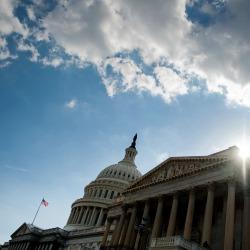BOB GARFIELD: While in the US, the media have almost universally glommed onto the blame game narrative to drive coverage of the government shutdown, reaction from around the world has been most diverse. Aviva Shen of the progressive website ThinkProgress did a round-up of reactions from around the globe. Aviva, welcome to On the Media.
AVIVA SHEN: Thanks for having me.
BOB GARFIELD: Can we start with Britain?
AVIVA SHEN: Anthony Zurcher in the BBC actually made the comparison to Syria and said that even in the middle of this bloody civil war, the Syrian government has continued to pay its bills and workers’ wages. And David Cameron even told BBC Radio 4 that it's a risk to the world economy if the US can't properly sort out its spending plans.
BOB GARFIELD: And the Daily Mail, the tabloid?
AVIVA SHEN: They just said, America Shuts Down in a very dramatic fashion.
BOB GARFIELD: There was a lot of criticism, some from obvious friends, like Germany, some from troublesome nominal allies, like Russia. Give me an idea of the scope of the reaction.
AVIVA SHEN: Germany was blaming a handful of radicals. Der Spiegel said that a superpower has paralyzed itself, and another paper said that there would be fatal consequences to the US recovery. And Russia, they were saying that the elephants are robbing the US government and that the US would be left penniless. And they were worrying about what it would do to Russian visas.
BOB GARFIELD: So, like the coverage in the US media, where there’s, you know, I don't know, 10,000 people killed in a monsoon and the headline is about the US citizen who’s unaccounted for, the coverage around the world was kind of parochial. The Russians [LAUGHS] were looking at the visa situation, that I think there was something about the International Space Station too, whether –
AVIVA SHEN: Yeah, yeah.
BOB GARFIELD: - it would be able to support the cosmonauts.
[SHEN LAUGHS]
Did that kind of “how does this affect us” ethic show up elsewhere?
AVIVA SHEN: Yeah, well, France was worried about tourists and also American cemeteries that were closed in France. Pretty much every international paper that I saw talked about the impact on tourists. And, of course, people are worried about world markets, which have so far stayed pretty steady, but who knows what'll happen if it goes on for much longer.
BOB GARFIELD: Tell me about South Korea. They have a particularly significant stake in American fiscal affairs.
AVIVA SHEN: Right. South Korea was pretty worried that it was going to affect the military presence in South Korea, that perhaps troops were gonna be scaled back. And Defense Secretary Chuck Hagel is there right now. He made sure to reassure everyone that budgetary issues were not going to require the US to reduce its military presence in South Korea.
BOB GARFIELD: As I looked at the coverage that you excerpted in your post, some of the most forgiving commentary came from China.
AVIVA SHEN: Voice of America interviewed a professor at the Carnegie Tsinghua Center for Global Policy in Beijing, and he said that if this were happening in another country, maybe it would be more concerning. But he believes in the maturity of the US government and American politicians to have the wisdom to come to a consensus and solve this issue smoothly, which is a lot more confidence than I've heard elsewhere. Europe may have been a little more critical, in part because the US has been doing so much financial proselytizing on the euro crisis, and I think that they see this as hypocrisy.
BOB GARFIELD: Oh, “physician, heal thyself.”
AVIVA SHEN: [LAUGHS] Yes, exactly.
BOB GARFIELD: Aviva thank you.
AVIVA SHEN: Thanks so much.
BOB GARFIELD: Aviva Shen is a reporter for thinkprogress.org.
